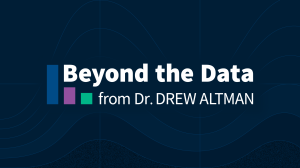Again, No Medicaid
Organization Guest Columnist


By Drew Altman
Originally Published by KFF on the Foundation’s Website on September 12, 2024
Of the three big public health insurance programs—Medicaid, Medicare, and the Affordable Care Act (ACA)—the ACA is the smaller one by a wide margin, in terms of the number of people covered and its share of the federal budget. (Yes, there is overlap, the ACA included the Medicaid expansion and several Medicare provisions). But again, at the presidential debate, only the ACA warranted a question. I guess that’s because former President Donald Trump proposed repealing it and it was the subject of fierce partisan warfare and legislative drama. Yet again, the program most likely to be in the crosshairs if Republicans take control—Medicaid—was not mentioned. And former President Trump has never been asked on a national stage: “Would you support a Medicaid block grant that significantly cuts the Medicaid program?”
Here’s why all roads lead to Medicaid in a Republican takeover:
- Republicans won’t want to cut Social Security, Medicare (or defense), and hand Democrats a powerful midterm election issue to hit them over the head with.
- But they will desperately need savings to pay for their proposed tax cuts and the only big program left in the federal budget is Medicaid, which represents more than $600 billion a year in federal spending.
- Republicans also generally don’t like Medicaid. They see it as program that primarily serves Democratic voters (there are about 20 million Republicans on Medicaid), and as a form of welfare with little difference from cash assistance, and not as health coverage. When you see Medicaid as “welfare,” you are more likely to want to cut it or impose requirements to get it. When you see it as insurance coverage, by contrast, you want to protect it and expand it when you can.
- Republicans also have a big largely unfulfilled ideological agenda they have always been up front about and believe in: to reduce the federal role on health and cut federal health spending. If they win, they will have no other big way to try to advance it.
Changes to the ACA may not be off the table even if repeal now is. There could be efforts to dilute protections for people with pre-existing conditions, which is a popular if not now sacrosanct provision. Republicans will not want to extend the enhanced ACA subsidies that benefit around 20 million people.
The Republican Study Committee has proposed a series of block grants combining ACA coverage provisions and Medicaid they estimate would cut federal spending by $4.5 trillion over ten years (not a typo). Project 2025 also proposes a block grant or its cousin, a per capita cap, and notably, adds lifetime limits for Medicaid coverage. Other conservative groups have made similar proposals, including some to curtail the Medicaid expansion.
Even with a Trump win, what happens in Congress will determine the scope of what can be done, and a Democratic House or Senate will block the most sweeping actions. Medicaid itself is a formidable opponent. It covers 81 million people. It is the single largest source of federal funding to states. It’s the major source of coverage for long-term care and for people with disabilities, both powerful lobbies, especially at the state level. About four in ten babies delivered in most states are covered by Medicaid. And while it’s not widely known, the program is almost as popular as Social Security and Medicare.
The most likely result is a big debate and a retreat to “waiver-land.” A waiver—which you will hear referred to as “a Medicaid section 1115 waiver”—is basically permission granted by CMS to states to do stuff differently under their Medicaid programs (governed by many rules and restrictions). Watch for waivers for time limits and for work requirements (currently in place only in Georgia). For premiums for beneficiaries. And for time limits on Medicaid eligibility. Even potentially to block grant the program in a state. There would be legal challenges to these waivers, opening up a new battleground in the arcane, inside baseball world of waivers that can have huge implications for people and for policy precedent.
I have said before that Trump’s silence on Medicaid is deafening. But so is the news media’s. Health policy can be mind-numbingly complex, but with 81 million people covered by Medicaid and proposals to drastically change it and cut spending swirling around Trump-land, Medicaid warrants greater attention.
The above article was written by Drew Altman, Beyond The Data, Again, No Data, KF, September 12, 2024, Again No Data, URL, September 13, 2024.

KFF is the leading health policy organization in the U.S.
“As a one-of-a-kind information organization, we bring together substantial capabilities in policy research, polling, and journalism in one organization to meet the need for a trusted, independent source of information on national health issues—one with the scope and reach to be a counterweight to health care’s vested interests and a voice for people.”
